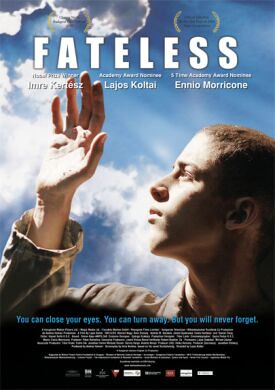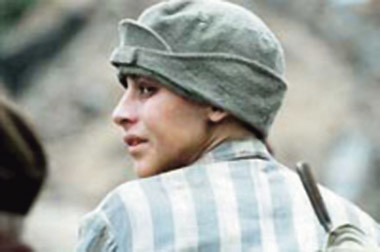Fateless * * * * *
 Movies about the holocaust always make one hesitate. "Am I really in the mood for this?" is the invariable question. Fateless is a movie set during the holocaust – although it is not *about* the holocaust. Rather it is a movie about the most profound experience of the script writer's life, which was the year he spent in a concentration camp in Poland. The film is not making a statement. It is not trying to 'make you understand'. Rather it is an honest and personal story about what it meant to him to go through this experience. In this, it challenges our definition of the horror of the holocaust, because that definition must somehow come to grips with… happiness. For the writer, happiness was the one free hour they had each day between end of work and lock-down in the barracks – an hour that just so happened coincided with dinner. This hour was raw happiness. In that moment, it seemed he was to say, you are not thinking about the bigger picture that your happiness is an artificial result of the fact that you are being worked and starved to death. You are concerned with the here and the now, with your small spot of reality, and in that moment, he experienced the intense happiness of a moment of free time combined with the anticipation of food. Also the film shows the profound bonding that occurred between the prisoners. Again it occurs when they are faced with inhumanity, for example being forced to stand all day and night, but nonetheless regardless of the reason, the reality is that intense bonding occurs. Also he experienced true friendship and kindness in the camps – from fellow prisoners in the camp who reached out to help him. In some ways the film reminded me of the feelings that war veterans try to convey – the conflicting feeling that their experience was hell but at the same time was the most profound and bonding experience of their life.
Movies about the holocaust always make one hesitate. "Am I really in the mood for this?" is the invariable question. Fateless is a movie set during the holocaust – although it is not *about* the holocaust. Rather it is a movie about the most profound experience of the script writer's life, which was the year he spent in a concentration camp in Poland. The film is not making a statement. It is not trying to 'make you understand'. Rather it is an honest and personal story about what it meant to him to go through this experience. In this, it challenges our definition of the horror of the holocaust, because that definition must somehow come to grips with… happiness. For the writer, happiness was the one free hour they had each day between end of work and lock-down in the barracks – an hour that just so happened coincided with dinner. This hour was raw happiness. In that moment, it seemed he was to say, you are not thinking about the bigger picture that your happiness is an artificial result of the fact that you are being worked and starved to death. You are concerned with the here and the now, with your small spot of reality, and in that moment, he experienced the intense happiness of a moment of free time combined with the anticipation of food. Also the film shows the profound bonding that occurred between the prisoners. Again it occurs when they are faced with inhumanity, for example being forced to stand all day and night, but nonetheless regardless of the reason, the reality is that intense bonding occurs. Also he experienced true friendship and kindness in the camps – from fellow prisoners in the camp who reached out to help him. In some ways the film reminded me of the feelings that war veterans try to convey – the conflicting feeling that their experience was hell but at the same time was the most profound and bonding experience of their life. Fateless is a beautiful and honest movie that I strongly recommend to anyone who has the film “Schindler’s List” on their personal top 100 film list. The writer is highly critical of Schindler’s List, which he views as not an honest portrayal of the experience, but rather a Hollywoodification of the experience and a film that makes us view the people sent to the camps as caricatures rather than people just like anyone else. Nonetheless I think that if you didn’t like Schindler’s List or intend never to see it, then Fateless probably isn’t for you either. Personally, I think Fateless is quite a bit better than Schindler’s List, and it surprises me that it did not get a bigger indie theatre showing in Seattle.
Fateless is a beautiful and honest movie that I strongly recommend to anyone who has the film “Schindler’s List” on their personal top 100 film list. The writer is highly critical of Schindler’s List, which he views as not an honest portrayal of the experience, but rather a Hollywoodification of the experience and a film that makes us view the people sent to the camps as caricatures rather than people just like anyone else. Nonetheless I think that if you didn’t like Schindler’s List or intend never to see it, then Fateless probably isn’t for you either. Personally, I think Fateless is quite a bit better than Schindler’s List, and it surprises me that it did not get a bigger indie theatre showing in Seattle.A clip from the movie (this is the low point for the protagonist):
Viewed on DVD from Netflix.
My epinions review of Fateless.

<< Home